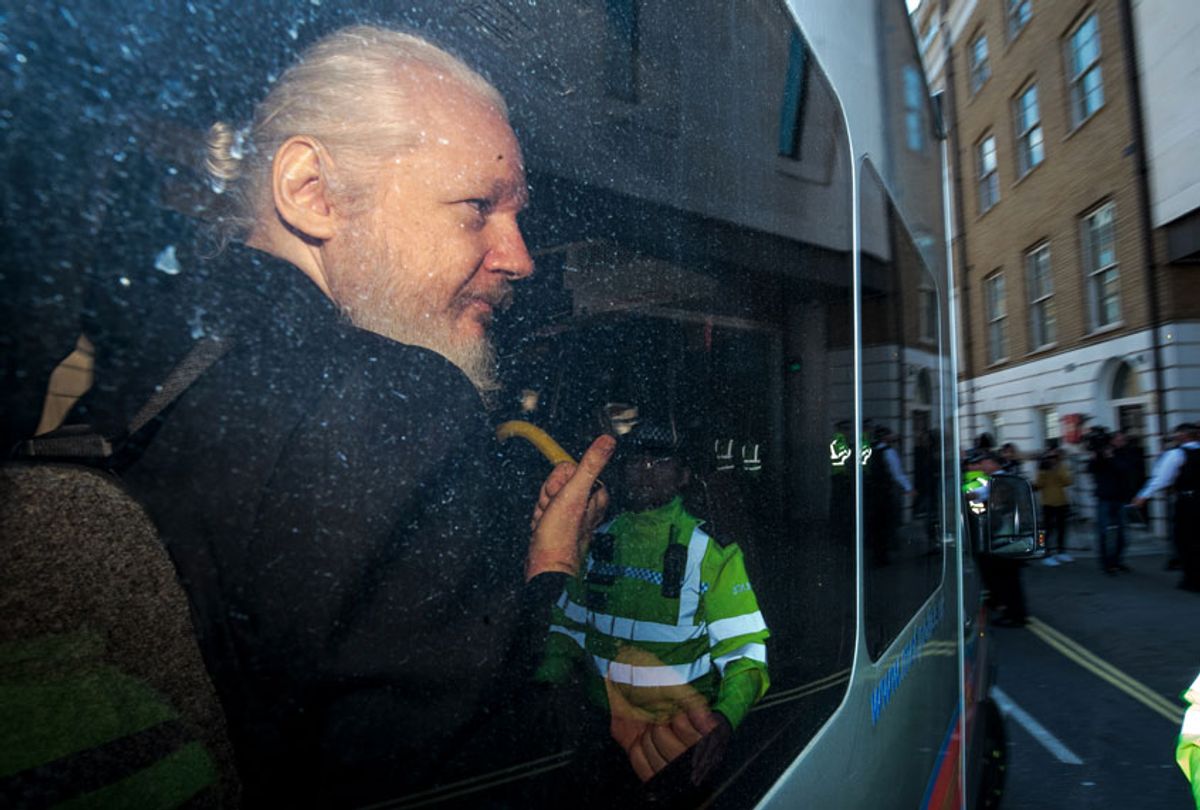Julian Assange, the founder of WikiLeaks, was sentenced by a British judge on Wednesday to 50 weeks in prison for jumping bail and taking refuge in the Ecuadorian embassy in London for seven years.
His sentencing comes a day before he is set to face his first extradition hearing in London related to separate charges in the United States of conspiring to hack a computer password. Another hearing is scheduled for June 12.
Assange had faced up to a year in a British prison for his bail violation — the maximum penalty for such an offense. He broke his bail conditions in 2012 when he fled to the Ecuadorian embassy in London after Sweden requested his extradition in a case involving allegations that he had sexually molested one woman and raped another in August 2010. Assange has maintained his innocence in connection to the sex abuse allegations, casting it as a ploy for his eventual extradition to the U.S. He will have a right to challenge the extradition request in British courts.
Sweden rescinded its arrest warrant for Assange in May of 2017, largely because there was no point trying to prosecute someone they could not extradite. But after his arrest in London last month, Swedish prosecutors said they were considering reopening the investigation into Assange. The statute of limitations for the alleged crimes does not expire until August of 2020. The WikiLeaks founder was physically dragged from the London embassy on April 11 after Ecuador rescinded his asylum and revoked his citizenship, saying he had committed "repeated violations to international conventions and daily life."
The decision by Ecuador's president, Lenin Moreno, points to a shift in the country's politics since it extended first extended refuge to Assange in 2012.
Moreno had previously pledged he would not turn Assange over to any country that has the death penalty. Assange accused the Ecuadorian government of attempting to end his asylum last year because of new rules the embassy imposed on him, which require him to pay for medical bills and phone calls, stay away from commenting on political issues online and clean up after his pet cat. Embassy staff have also reportedly complained of Assange "riding a skateboard in the halls, of playing soccer on the grounds and behaving aggressively with security personnel."
Hours after Assange was arrested, U.S. prosecutors confirmed that they had charged Assange with one count of conspiracy to hack a computer for his role in the 2010 release of thousands of secret government documents.
The single charge — conspiracy to commit computer intrusion — comes from what prosecutors said was Assange's agreement to break a password on a classified U.S. government computer. There is no evidence that the password-cracking efforts succeeded, according to court documents, and Assange's defenders have pointed out that the goal of the alleged hacking attempt was to help former U.S. Army intelligence analyst Chelsea Manning conceal her tracks, not to gain access to specific secret information.
Assange has been under investigation by the U.S. Department of Justice since 2010, after WikiLeaks published thousands of classified documents and videos about the wars in Afghanistan and Iraq, along with confidential diplomatic cables and files from Guantánamo Bay about prison camp detainees. The secret government records and communications were stolen by Manning, at the time an Army specialist known as Bradley Manning, who was serving in Iraq.
"Assange knew that Manning was providing WikiLeaks with classified records containing national defense information of the United States," prosecutors wrote in the court filings. "Assange was knowingly receiving such classified records from Manning for the purpose of publicly disclosing them on the WikiLeaks website."
The Department of Justice has confirmed that Assange is being charged with engaging in a conspiracy "to assist Manning in cracking a password stored on U.S. Department of Defense computers," according to a government press release.
Assange has most recently come under attack for claims that WikiLeaks posted thousands of emails stolen from Democrats by Russian agents during the 2016 presidential election, which has been a focus of several investigations into alleged collusion between President Trump's campaign and Russia. U.S. intelligence agencies have repeatedly said the systems were hacked by Russian agents, which Assange has denied, as have Trump and Vladimir Putin.



Shares